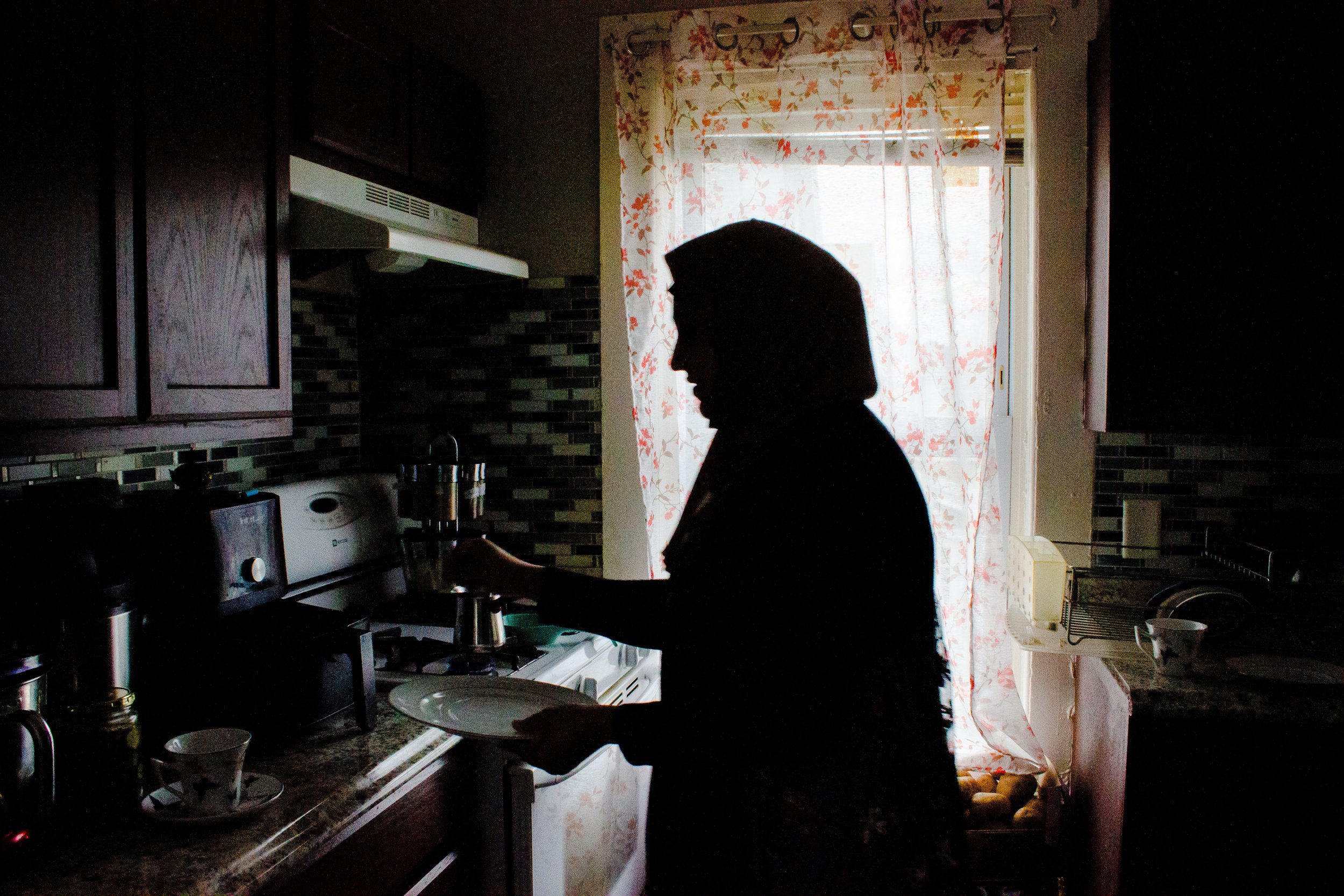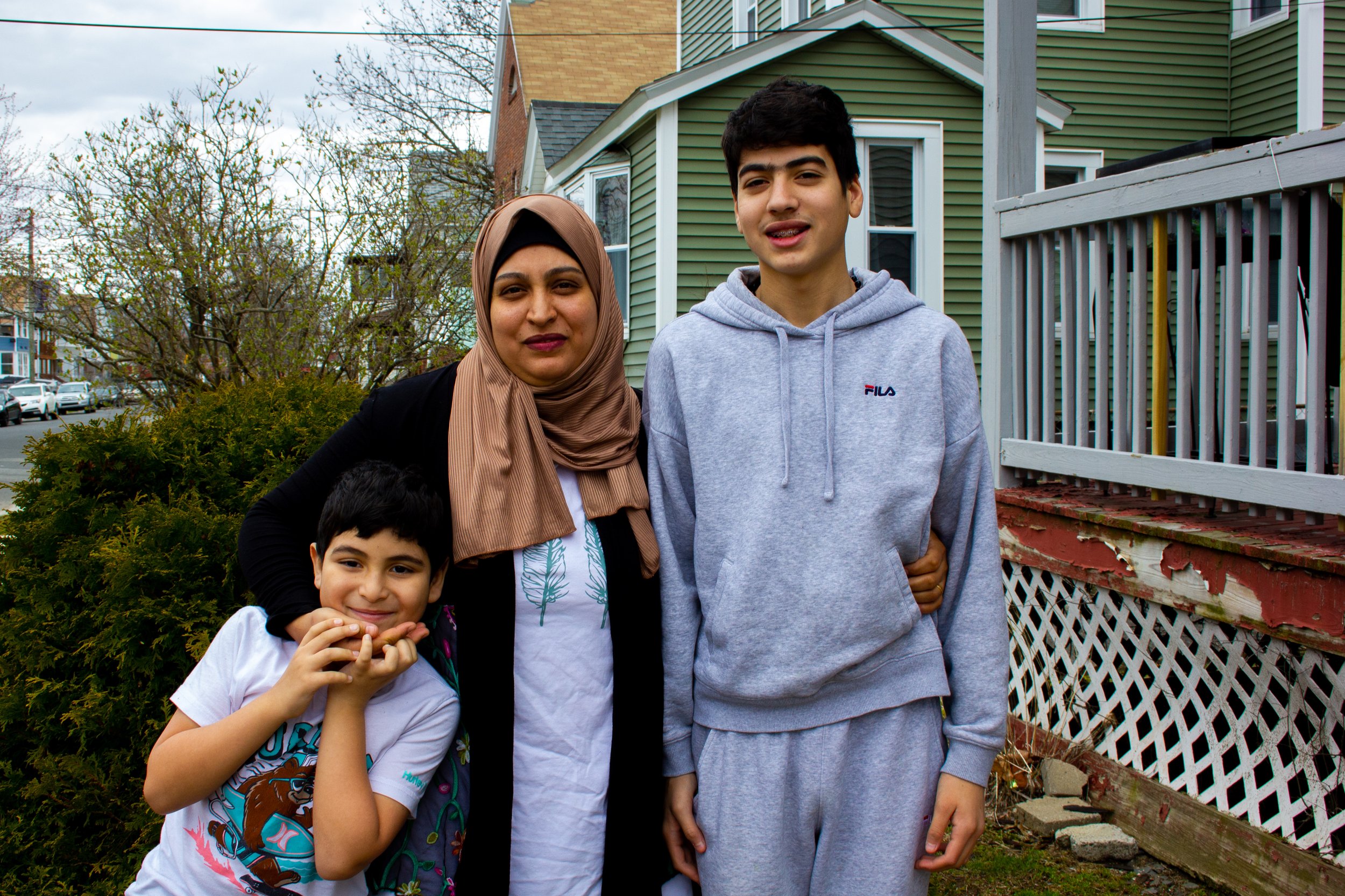to begin anew
MASEMO



“When I was little, I would hear gunfire and run and hide under the bed.” Masemo tells me.
She grew up in the Democratic Republic of Congo.
It was common for families to spend most of the day outside – cooking, eating, and conversing – but at the first sound of gunfire, everyone would rush inside to take cover. Militants from both sides of the conflict would show up and massacre entire families, destroy houses, steal, and commit other atrocities. “If they came inside [your house], your life would be over.”
Masemo and her family struggled to make money and have enough food to eat because of the war. So in 2007, when Masemo was 27 years old, she fled to Nairobi, Kenya with her 15 year old sister and two children. She was forced to leave her parents behind.
An NGO helped her apply for refugee status to come to America. Six years later, Masemo and her family moved to Springfield in November of 2015.
Masemo initially worked as a housekeeper at a nearby hotel, but wanted to pursue a different path for herself. She went back to school, learned English, learned how to drive, and became a CNA (Certified Nursing Assistant). She wants to go back to school and become a Resident Nurse someday. Now that she is an American citizen, she has booked a trip to Africa to see her family after multiple years of not seeing them. Her parents are still not safe. She still hears stories of atrocities. “They call me and tell me we didn’t sleep tonight…They killed our neighbor.” But luckily, she and her two young boys are safe.
In eastern Congo, soldiers of the national army and combatants of armed groups continue to target civilians, killing, raping, and otherwise injuring them, carrying out arbitrary arrests and torture, and destroying or pillaging their property. On August 2, 2021, outside the village of Idohu, Ituri, alleged ADF fighters abducted and tied up 14 people who were cutting wood on the edge of the forest, and then executed them. Their bodies were laid in a line across the road. Some of the victims’ throats were cut or their skulls cracked, while others appear to have been shot (HRW).
BARAA



It is tradition in Islamic cultures to always serve food for your guests, and despite it being Ramadan, and the whole family fasting, Baraa warms up some traditional Syrian food and Arabic coffee for me. I thank her and bite into the sweet and flavorful sfeehas, Lebanese meat pies.
In 2011, the Syrian War uprooted the Ismail’s life and as violence quickly engulfed their home country, they fled to Lebanon. After a few years, Baraa and the Ismail family moved to the United States in 2016, having been granted refugee status – an opportunity many families in war-stricken countries dream of.
“At first, it was very hard.” Baraa says of the adjustment to life in America. Not only did they not speak the language, Baraa was forced to leave her parents, brothers, and sisters behind in Syria. But it got a lot easier, she explains, once her husband found a job. That helped bring stability to their family, and accelerated the process of learning English.
What is it like now living in America, I ask. The boys translate some of my questions and Baraa’s answers. Baraa tells me that she loves living in Massachusetts and feels blessed to have made it out of a collapsing country. It means everything to her and her husband to be able to raise her family somewhere free from violence, with good schools and ample opportunity. Everyone here treats them with kindness, the Ismails explain.
On February 9th, 2022, Baraa officially became an American citizen after passing the citizenship test. An American passport, I tell them, means the world is their oyster – they can now travel almost anywhere they’d like. The young boys excitedly tell me they plan to go back to Syria this summer to see family they haven’t seen in years. It will be the boys first time back since the war.
As of March 2022, roughly 5.7 million Syrians have fled to neighboring countries, according to the UN High Commissioner for Refugees, and more than 6.7 million people are displaced internally. 40% of schools have been damaged or destroyed and more than two million children are out of school. (NRC)
LUKIKI



“You hear about America as this beautiful and magical place. Like a second heaven.” Lukiki tells me. She is a beaming young woman with a bright smile and friendly demeanor.
Lukiki first came here when she was just 21 years old. She was pregnant at the time.
Originally born in the Democratic Republic of Congo, her family was forced to leave the DRC because of the decades-long war. They fled to Zambia, where she grew up.
“My mom had a farm where she grew maize, cassava, and beans. But my family still struggled to feed everyone.” They were safe from the war, but lacked economic opportunity and access to a quality education. “I went to high school at a refugee camp in Zambia because we had no money,” she says to me.
After 15 years of living in Zambia, she came to America as a refugee, following in her older brother's footsteps.
While America wasn’t exactly what she pictured in her head – not quite “heaven”, Lukiki is now able to get the education she always wanted. In 2020, she graduated with an associate’s degree in liberals arts. She desperately wants to get her bachelor’s but due to health problems, she was forced to leave school. She’s counting down the days until she can go back.
5.6 million Congolese are internally displaced in the DRC, with over 990,000 refugees and asylum-seekers currently sheltered across the African continent (UN).
Almost 70 percent of the population is engaged in subsistence farming, and farmers routinely lack the resources they need—such as tools and seeds—to make a living from their work. Many people don’t have enough food, with 21.8 million facing crisis or worse levels of food insecurity—the highest number that has ever been recorded in any country (IRC).